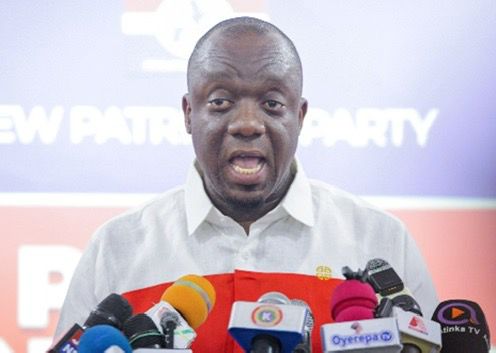The New Patriotic Party (NPP) has launched a scathing attack on the John Mahama-led National Democratic Congress (NDC) government, accusing it of misusing state security agencies to suppress political dissent rather than addressing critical national issues. The NPP’s condemnation stems from the recent arrest and detention of its Bono Regional Chairman, Kwame Baffoe, also known as Abronye, on charges of offensive conduct conducive to breaching the peace. Abronye’s alleged offense involved insulting the Inspector General of Police (IGP), COP Christian Tetteh Yohuno, leading to his arraignment before an Accra Circuit Court and subsequent remand into police custody. The NPP contends that this arrest is not an isolated incident but rather a component of a larger, orchestrated campaign of political intimidation targeting opposition figures.
The NPP’s press release, issued by General Secretary Justin Kodua Frimpong, argues that the Mahama administration has demonstrably shifted its priorities away from tackling crucial national challenges. Instead of focusing on combating illegal mining (galamsey) and addressing escalating insecurity in volatile regions like Bawku, Nkwanta, and Gbeniyiri – where recent clashes have resulted in significant loss of life and widespread displacement – the government has allegedly chosen to weaponize state security apparatus against its political adversaries. The NPP underscores the gravity of the situation in these conflict zones, highlighting the devastating impact on communities with over 32 lives lost and more than 50,000 people displaced. The party criticizes the government’s perceived inaction and alleges a deliberate diversion of resources from these pressing concerns to pursue politically motivated prosecutions.
Central to the NPP’s argument is the accusation of selective justice. The party alleges a stark contrast in the treatment of NDC activists and opposition members. While NDC figures who engage in controversial rhetoric or potentially offensive conduct appear to enjoy impunity, opposition voices face swift arrest and prosecution. This perceived double standard, according to the NPP, undermines the principles of fairness and equality before the law, creating an environment of fear and chilling freedom of expression. The NPP emphasizes that such actions erode public trust in the impartiality of state institutions and reinforce the perception of a politically motivated crackdown on dissent.
The NPP further contends that the arrest and prosecution of Abronye are disproportionate to the alleged offense. The party argues that if the IGP felt defamed by Abronye’s comments, the appropriate recourse should be a civil defamation suit rather than criminal prosecution. The use of criminal charges, the NPP asserts, is a clear indication of the government’s intent to intimidate and silence its critics. By resorting to criminal proceedings in cases that could be handled through civil litigation, the government sends a chilling message to those who dare to criticize its actions or policies.
The NPP’s accusations paint a picture of a government preoccupied with suppressing dissent rather than addressing the myriad challenges facing the nation. The party’s statement highlights the stark contrast between the government’s alleged focus on silencing political opponents and the urgent need for action on issues like illegal mining and escalating violence in conflict-prone areas. The NPP emphasizes the human cost of this inaction, pointing to the loss of life, displacement, and ongoing insecurity in affected communities.
The NPP’s challenge to the Mahama administration underscores the critical importance of upholding democratic principles and ensuring the fair and impartial application of the law. The party’s concerns regarding the alleged misuse of state security agencies and the perceived selective application of justice raise serious questions about the government’s commitment to protecting fundamental freedoms. The NPP’s call for a shift in focus from political persecution to addressing pressing national issues resonates as a plea for responsible governance and a commitment to serving the interests of all citizens, not just those aligned with the ruling party. The party insists that addressing the root causes of insecurity and environmental degradation, rather than silencing dissenting voices, is the path to a more stable and prosperous future for Ghana.














